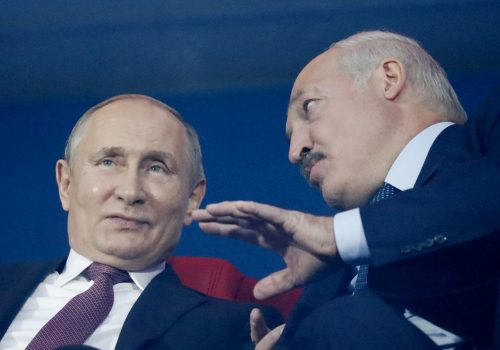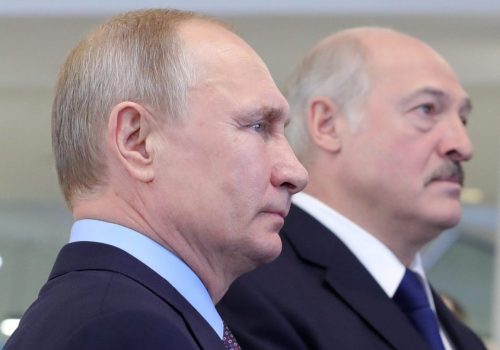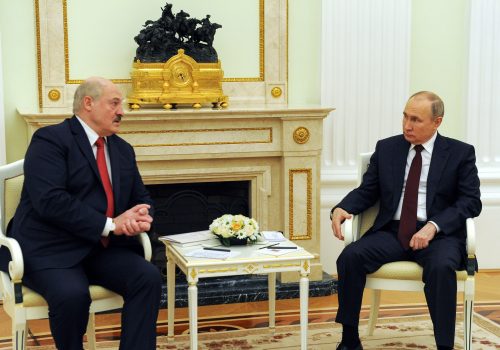Belarus air piracy: How the world should respond
Belarusian President Alyaksandr Lukashenka and his regime crossed a new line in their May 23 attack on a civilian passenger plane flying over Belarus’s territory on a regular journey between Athens, Greece, and Vilnius, Lithuania. The Belarusian air force compelled the RyanAir flight to land in Minsk under the false pretense of a bomb threat. The regime’s purpose was to grab a dissident blogger named Roman Protasevich who was living outside Belarus. It’s an act rightly described as air piracy, a hijacking, and a kidnapping. By seizing a dissident journalist, the Lukashenka regime launched an assault on democracy. By threatening a civilian airliner, it carried out an assault on what US Secretary of State Antony Blinken has called the rules-based international order.
Lukashenka and the Putin regime that supports him seem to feel impunity, based on the belief that Europe and the United States are too distracted to respond. Margarita Simonyan, head of the Kremlin propaganda organ RT, gloated about the attack on Twitter, saying of Lukashenka: “The Old Man did beautifully.”
But the Lukashenka regime and its cheerleaders in Moscow may have miscalculated. Within hours, senior Europeans called for a strong response. The Polish and Lithuanian governments—steady supporters of the Belarusian democracy movement—led the way, but they were not as far out in front as usual. European Commission President Ursula Von der Leyen stated the same day as the assault that the “outrageous and illegal” action by the Lukashenka regime will have consequences, and German Foreign Minister Heiko Maas followed with a similar statement on Monday. Not evident were the usual European divisions when faced with aggression from the Kremlin or its friends. One well-connected French observer told me that Europeans—whatever their views on Lukashenka and Putin—were seeing the Belarus attack on a European airliner flying between two European Union (EU) capitals as an assault on Europe itself.
Outrage at aggression should lead to action. What are the options for the EU, United States, United Kingdom, and others?
A civil-aviation response to the Lukashenka regime’s assault on civil aviation would seem to be a sound first step. And it can be a big one. Banning Belavia—Belarus’s state-owned airline—from EU and NATO airspace seems appropriate. The UK did so on Monday. Instructing EU (and other) civil-aviation authorities to avoid Belarusian airspace altogether seems prudent, given the demonstrated threat. (It is not a long drive from Vilnius to Minsk; EU citizens, Americans, and others living in the Belarusian capital would retain travel options.) Baltic Air and Hungary’s Wizz Air have already announced they will avoid Belarusian airspace, and the European Council—scheduled to meet Monday evening—may move in that direction.
The regime’s new aggression in going after dissidents living outside Belarus—on top of its arrests inside the country—may call for an even stronger reaction. The US, EU, UK, and others could impose sanctions on the $3.5 billion that the National Bank of Belarus states as sovereign debt; Belarus sold $1.35 billion of sovereign debt in late June 2020. Unlike more restrained US actions in April against Russian sovereign debt, the transatlantic democracies should ban both primary and secondary trading of new Belarusian debt. This sanction should be linked to Belarus’s holding of political prisoners; should the regime release all of them—including Protasevich—the ban could be lifted.
The choices about a transatlantic response become harder if it turns out that Russian authorities were involved in the airliner piracy, which numerous (but so far unconfirmed) reports have suggested but which is not clear as of this writing. As in past cases, independent investigators (like the UK’s Bellingcat) may uncover evidence of Russian security-service involvement.
If these reports are true, official Russian involvement in another attack on a civilian airliner (recalling when Russian-led forces in eastern Ukraine shot down Malaysia Airlines Flight 17 in July 2014) would also cry out for a response. A civil-aviation reaction such as banning Russian flag carrier Aeroflot from Western airports, however, would be costly for Europe and the United States as well as for Russia given the almost-certain retaliation from Moscow. The United States and EU could, as an alternative, regard Russian involvement principally as an intelligence abuse, akin to its ugly practice of assassinating opponents abroad. An appropriate response in this case might include more expulsions of Russian intelligence officers and exposure of Russian operations, or more sanctions under Biden’s April 15 executive order combating Russia’s external aggression.
A longer-term response in any case could be for the United States and Europe to increase their support for investigative journalism, both inside and outside the country, targeted to a Russian audience. Protasevich, like imprisoned Russian opposition leader Alexei Navalny, raises the Kremlin’s ire by penetrating the noise of propaganda. To honor their work, we can act to advance the democratic cause that they represent.
Above all, the West should act to penetrate the wall of impunity that Russian President Vladimir Putin and his client Lukashenka believe protects them.
Daniel Fried is the Weiser Family distinguished fellow at the Atlantic Council. He was the coordinator for sanctions policy during the Obama administration, assistant secretary of State for Europe and Eurasia during the Bush administration, and senior director at the National Security Council for the Clinton and Bush administrations. He also served as ambassador to Poland during the Clinton administration. Follow him on Twitter @AmbDanFried.
Further reading
Image: Belarusian President Alyaksandr Lukashenka visits a polling station during the presidential election in Minsk, Belarus, on August 9, 2020. Photo by Sergei Gapon/Pool via Reuters.


